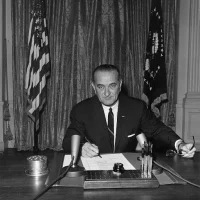The Arab world’s longest-ruling monarch at the time of his death, King Hassan II survived several coup attempts during his reign. By far the strangest occurred in the middle of his forty-second birthday party. The King had provoked strong opposition, protest demonstrations, and riots in response to his centrally controlled rule. He had dissolved Parliament… Read More "The Birthday Party Coup Attempt on Morocco’s King Hassan II"
The Gulf of Tonkin attack on August 2, 1964 and another many believed to take place on August 4 led to an escalation of U.S. involvement in the Vietnam War. The USS Maddox was patrolling the Gulf of Tonkin, situated between North Vietnam and China, collecting intelligence in international waters when it engaged three North… Read More "The Gulf of Tonkin Resolution"
USS Vincennes Shoots Down Iran Air Flight 655
The Iran-Iraq War created turmoil in the Persian Gulf as the combatants attacked civilian oil tankers, merchant ships, and other foreign vessels in the area. This resulted in several conflicts between Iranian and American ships. In May 1987, the Iraqi Air Force killed 37 American sailors on board USS Stark, an American Navy frigate. Another… Read More "USS Vincennes Shoots Down Iran Air Flight 655"
Broken Bones, Broken Dreams, Broken Homeland: The First Intifada, 1987
On December 9, 1987, the deaths of four Palestinian refugees plunged the nation of Israel into four years of strikes, boycotts, beatings, shootings, and gassings as Palestinians in Gaza, the West Bank, and East Jerusalem rebelled against their Israeli occupiers. When Palestinian fighters attacked with stones and Molotov cocktails, killing military personnel and destroying the… Read More "Broken Bones, Broken Dreams, Broken Homeland: The First Intifada, 1987"
India and Pakistan on the Brink: The 1998 Nuclear Tests
In May 1998, India conducted its first nuclear bomb tests since 1974 at the Indian Army Pokhran Test Range. Known as Pokhran-II, the tests involved five detonations and were followed by Prime Minister Atal Bihari Vajpayee declaring India a full nuclear state. India’s Bharatiya Janata Party (BJP) had come to power in the 1998 elections… Read More "India and Pakistan on the Brink: The 1998 Nuclear Tests"
Kashmir and the 1965 Indo-Pakistani War
In the summer of 1965, India and Pakistan returned to the battlefields of Kashmir in a renewed attempt to establish their respective claims over the disputed, fertile region. On August 5th, more than 25,000 Pakistani soldiers, disguised as Kashmiris, infiltrated the area, mingling with their Muslim coreligionists and encouraging insurgency. Indian forces responded violently, launching… Read More "Kashmir and the 1965 Indo-Pakistani War"
The Overthrow of President Obote and Evacuation from Uganda
After a disputed election brought Milton Obote (at right) to power in Uganda in 1980, one of his opponents, Yoweri Museveni, led an armed resistance against the government. The subsequent Ugandan “Bush War” between Museveni’s National Resistance Army (NRA) and the government’s Uganda National Liberation Army (UNLA) lasted from 1981 to 1986. In 1983, ethnic… Read More "The Overthrow of President Obote and Evacuation from Uganda"
Despite its less-than-auspicious opening on July 17th, 1955 (unexpected massive crowds, insufficient water and melting pavement), Disneyland has occupied an almost mythical place in people’s hearts for generations. Yet when you think of Disneyland, you picture kids running around and/or screaming, Mickey ears, incredible rides, turkey legs, and princesses – so many princesses. You probably… Read More "Disney World: The Happiest Diplomatic Meeting Place on Earth"
The 1974 Turkish Intervention in Cyprus
The “Cyprus problem” of ongoing conflict between the Greeks and Turks on the Mediterranean island of Cyprus came to a head in July 1974 when a Greek-backed coup d’état on July 15 prompted a Turkish intervention five days later. In the spring of 1974, President of Cyprus Archbishop Makarios III learned of plans for a… Read More "The 1974 Turkish Intervention in Cyprus"
The Iraqi Revolution — of 1958
In 1958, the 14 July Revolution ended the thirty-seven-year Hashemite monarchy of Iraq in a coup d’état and established the Republic of Iraq. The Free Officer group, led by General Abd al-Karim Qasim and his associate Colonel Abdul Salam Arif, was inspired by Pan-Arab nationalism and Nasser of Egypt’s 1952 overthrow of the Egyptian monarchy.… Read More "The Iraqi Revolution — of 1958"


